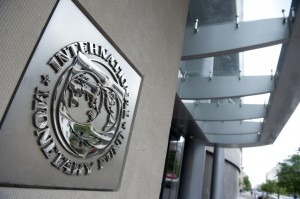
(AFP Photo)
Egypt is in the final stages of verifying its economic reform programme with the International Monetary Fund (IMF) in pursuit of a much-delayed $4.8bn loan, Central Bank of Egypt (CBE) governor Hesham Ramez said yesterday.
“The IMF is verifying numbers with the government regarding the programme and they are the in late stages of this,” Ramez told media.
Ramez added that no changes will be made to the size of the loand, but estimates of when the deal will be finalised have yet to be revealed.
“We are indeed in the last stages of the deal, as the governor stated, but we don’t know yet when exactly [we will] seal the deal,” said Ahmed Sakr, employee at the CBE.
Egypt has been negotiating with the global lender over the proposed $4.8bn loan package for two years now, but political unrest and public resistance to implementing economic reforms have postponed the deal numerous times.
The IMF has requested that Egypt adopt an economic and social reform programme in order to secure the loan.
President Mohamed Morsi announced a number of economic measures last December as requested by the IMF, including tax hikes and curbing energy and food subsidies to reduce the public deficit and boost state revenue.
Tax hikes were imposed on a number of consumer goods and services, including cement, steel, cigarettes, soft drinks and other products. However, Morsi rescinded his decision after a public outcry.
Later in February, however, he introduced additional reforms, including a raise on the minimum monthly income for income tax exemption from EGP 9,000 to EGP 12,000, which he said “should help alleviate a tax burden on 2.5 million families.”
Despite disapproval from the public and the opposition over the impact of the loan on the poor, Morsi’s government believes that the loan will help stabilise the country’s economy and finances.
Last month, US Secretary of State John Kerry urged Morsi to quickly adopt economic and political reforms if the country is to receive much-needed US and global aid.
The aid would come at a time when Egypt is struggling with declining foreign currency reserves, which currently stand at $16.04bn compared to $13.4bn in March, which was enough to cover only three months of imports.
The IMF has also issued a report in which it has expected Egypt’s budget deficit to widen to 11.3% of gross domestic product in the current fiscal year, which ends 30 June.
Inflation meanwhile inched up to 8.2% in May due to an increase in food prices and a weak local currency.




